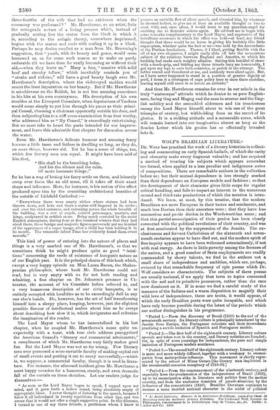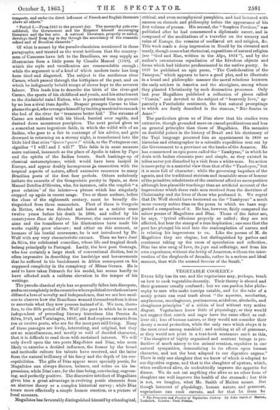WOLF'S BRAZILIAN LITERATURE,* Du. WOLF has practised the work of
a literary historian in collect- ing and commenting on early Spanish ballads, of which the rarity and obscurity make every fragment valuable ; and has acquired a method of treating his subjects which appears somewhat
too formal, when applied to a less peculiar and indigenous series of compositions. There are remarkable authors in the collection. before us; but their mutual dependence is less strongly marked than their dependence on European models and fashions ; so that the development of their character gives little scope for regular critical handling, and fails to impart an interest to the numerous second and third-rate productions of which the mention is intro- duced. We learn, at most, by this treatise, that the modern Brazilians are more European in their tastes and sentiments, and much less Iberian than their ancestors were ; that they have less mannerism and poetic diction in the Wordsworthian sense ; and that this partial emancipation of their genius has been closely connected with the political revolutions of their country, and was at first accelerated by the suppression of the Jesuits. The ex- clusiveness and fervent Catholicism of the sixteenth and seven- teenth centuries appear to have died out, and the modern spirit of free inquiry appears to have been welcomed ostentatiously, if not with real energy. As there is little poverty among the freemen of the nation, and a good number of State employments are readily commanded by showy talents, we find in the authors not a small share of independence and ambition, which are, perhaps, evinced by that remarkable frequency of epic poems which Dr. Wolf considers so characteristic. The subjects of these poems
are usually national, if we apply that term to topics connected with the soil and its primitive possessors, rather than the race now dominant on it. If in some we find a careful study of the manners of the Indians and a warm disposition to magnify their wild love of independence, these are traits, it would appear, of which the early Brazilian poets were quite incapable, and which have only become possible during the latest of the periods which our author distinguishes in his programme.
"Period I.—From the discovery of Brazil (1500) to the end of the seveuteenth century. Its literary culture is principally introduced by the Jesuits from Europe, the Portuguese colonists and their descendants practising a servile imitation of Spanish and Portuguese models.
"Period 2.—The first half of the eighteenth century. Literary culture spreads acd takes root in the country, and literary societies are founded; but, in spite of some yearnings for independence, the pure and simple imitation of Portuguese models continues.
"Period 3.—The second half of the eighteenth century. Literary culture is more and more widely diffused, together with a tendency to emanci- pation from metropolitan influence. This movement is chiefly repre- sented by the school of Minas Geraes [the literary men implicated in the unsuccessful secession conspiracy of 1788-92.]
"Period 4.—From the commencement of the nineteenth century, and especially from the proclamation of the independence of Brazil (1822), up to its emancipation alike in literature and politics from the mother country, and from the exclusive dominion of pseudo-etas:kiwi' by the influence of the romanticists (1840). Brazilian literature continues to assume a more decided national character in the midst of political
* Le Brail Latiraire. Histoire de la Laterature Brisaienne, stasis dun Choir de Moreeasx tires des mellitus: Antears Bristliest. Par Ferdinand Wolf, Dooteur en Philesophie, Conservatear de la Bibliotheque Imp. de Vienne, em. Berlin: A. Asher and Co. 1863.
tempests, and under the direct influence of French and English literature above all others."
"Period 5.—From 1840 to the present day. The monarchy gets con- solidated, the Government and the Emperor himself encouraging literature and the fine arts. A national literature, properly so called, develops itself from day to day through the ascendancy of the romantic school and of Brazilian elements."
Of what is meant by the pseudo-classicism mentioned in these paragraphs, and treated as the worst heirloom that the country- men of Camoens have left to the Brazilians, we may supply an illustration from a little poem by Claudio Manoel (1768), of which the style and versification are commendable enough ; while the argument is of a kind of which modern taste has long been tired and disgusted. The subject is the auriferous liver Carmo, which passed through the birthplace of the poet, and on which be indignantly beheld troops of slaves kept to the severest
labour. This leads him to describe the birth of the river-god Caren°, the sports of his childhood and youth, and his attachment to the disdainful naiad Eulina, who is protected from his pursuit by no less a rival than Apollo. Despair prompts Carmo to blas- pheme the god, who revenges himself by nci ting m ankind to ransack the bed of the river for "treasures better hid." The streams of Carmo are reddened with his blood, hurried over rapids, and dashed down monstrous precipices. The next period gives us a somewhat more ingenious fable, in which the wilful wife of an Indian, who goes to a fair in contempt of his advice, and gets drowned in returning on a stormy night, is transformed into the little bird that cries "Quero I quero I" which, to the Portuguese ear, signifies "I will ! and I will !" This fable is in some measure more national, inasmuch as the place of Apollo is taken by Tupa and the spirits of the Indian forests. Such hashings-up of classical metamorphoses, which would have been insipid in Europe, and appear doubly incongruous 4n connection with the tropical aspects of nature, afford extensive resources to many Brazilian poets of the first four periods. Others sedulously imitate the conceits of the Gongoristic poetry in Spain, as does Manoel Botelho d'Oliveira, who, for instance, calls the crayfish " a poor relation" of the lobster—a phrase which has singularly cropped up again in recent usage. Two or three authors, before the close of the eighteenth century, must be broadly dis- tinguished from these mannerists. First of these is Gregorio de Mattes, who was dreaded and hated as a satirist some twelve years before his death in 1696, and called by his countrymen Boca da Inferno. However, the narrowness of his aims and the homeliness of his illustrations have made his works rapidly grow obscure ; and either on this account, or because of his bestial coarseness, he is not introduced by Dr. Wolf with any very characteristic extract. Then we have Jose da Silva, the celebrated comedian, whose life and tragical death belong principally to Portugal. Lastly, the love poet Gonzaga, who has certainly a large stock of conventional diction, but is often impressive in describing the hardships and bereavements that he suffered in his banishment in Africa consequent on his supposed complicity in the conspiracy of Minas Geraes. He is said to have taken Petrarch for his model, but seems hardly to have affected such a uniform elevation in the temper of his
writings.
The pseudo-classical style has so generally fallen into disrepute,
and most completely in the countries where poll deal revolutions have diffused a love of novelty and independence, that we are less anxi- ous to observe how the Brazilians weaned themselves from it than to ascertain what they now possess instead of it. We turn, there- fore, to the fifth period of Dr, Wolf (the part in which he is most independent of preceding literary historians like Pereira da Silva, 1843, and Varnhagen, 1853), and find copious extracts from ten or twelve poets, who are for the most part still living. Many ,of these passages are lively, interesting, and original, but they are so miscellaneous, and mostly so void of decided character, that it is difficult to read them with sustained interest. We will only dwell upon the two poets Magalhaes and Diaz, who seem likely to exercise a decided influence, the former by the broad and methodic culture his talents have received, and the latter from the natural brilliancy of his fancy and the depth of his sus- ceptibilities. The gifts of Diaz appear more specially poetic, for Magalhaes can always discuss, balance, and refine on his im- pressions, while Diaz's are, for the time being, convincing, engross- ing, and perfectly positive. The discursive intellect of Magalhaes
gives him a great advantage in evolving poetic elements from an abstruse theory or a complex historical survey ; while Diaz treats more effectually a simple human emotion, or a picture of local manners.
Magalhaes has favourably distinguished himself by ethnological,
critical, and even metaphysical pamphlets, and had lectured with success on rhetoric and philosophy before the appearance of his first volume of poems. His second, the " Suspiros Poeticos," was published after he had commenced a diplomatic career, and is composed of the meditations of a traveller on the scenery and ruins of Europe, the remains of mediteval art and religion, &c. This work made a deep impression in Brazil by its elevated and manly, though somewhat rhetorical, expositions of natural religion (see "God and Man, written in the Alps, 1834 "), and by the author's ostentatious repudiation of the frivolous objects and forms which had hitherto predominated in the native poetry. In 1857 he published an epic poem, "The Confederation of the Tamoyos," which appears to have a good plot, and to illustrate in a broad and philosophic manner the moral relations between the early settlers in America and the aborigines, among whom they planted Christianity by such destructive processes. Only last year Magalhaes published a collection of pieces called "Urania," and devoted to the subject of "heavenly love," ap- parently a Pantheistic sentiment, the first natural promptings to which are finely described in the stanzas, " Nao Sentes tu Amor."
The particulars given us of Diaz show that his studies were extensive, though grounded more on casual predilections and less on general principles than those of Magalhaes. His memoirs on doubtful points in the history of Brazil and his dictionary of the Tupi language procured him an appointment in 1858 as historian and etlmographer to a scientific expedition sent out by the Government to a province on the banks of the Amazon. He has commenced an epic poem called the " Tambyras," in which he deals with Indian elements pure and simple, as they existed in tribes never yet disturbed by a visit from a white man. Its action is more petty in a material view than that of the " Tamboyos," but it is more full of character; while the governing impulses of the agents, and the traditional stoicism and insatiable sense of honour of the primitive inhabitants of the continent afford us more positive although less plausible teachings than an artificial account of the impressions which these rude men received from the doctrines of Christianity and the lives of those who professed it. We regret that Dr. Wolf should have bestowed on the " Tambyras" a much more cursory notice than on the poem to which we have sug- gested a comparison of it. He has, however, fairly compared the minor poems of Magalhaes and Diaz. Those of the latter are, he says, "lyrical effusions properly so called ; they are not affected, but bear the stamp of a true inspiration ; one sees that the poet has plunged his soul into the contemplation of nature and is relating his impressions to us. Like the poems of M. de Magalhaes they are elegiac, but distinguished by pathos and sentiment taking up the room of speculation and reflection. Diaz has also sung of love, its joys and sufferings, and from his own experience, without the levity of Anacreon, without the inter- vention of the shepherds of Arcadia, rather in a serious and ideal manner, than with the sensual fervour of the South."































 Previous page
Previous page